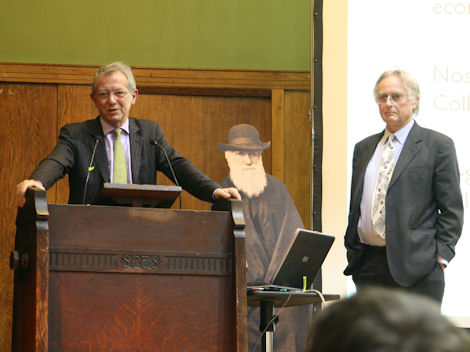Since I posted this blog, the BHA have issued a video of the whole event. So for a summary – read the blog; for the whole smash…here it is!
Disney’s Dumbo the Elephant got rid of his magic feather. He realised it was just a temporary crutch that gave him the courage to be all that he could be.
For philosopher Daniel Dennett, speaking on ‘A Darwinian Perspective on Religions’ , religion is just like Dumbo’s feather – a crutch we can do without. This is a summary of the British Humanist Association (BHA) event I joined earlier this month at South Place Ethical Society’s Conway Hall in London.
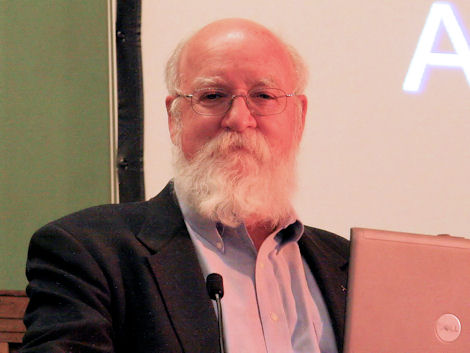
Chairing this second lecture in the BHA’s Darwin 200 special lecture series, Richard Dawkins introduced Daniel Dennett as the scientists’ philosopher; someone who takes time out to keep up to date with the scientific literature. And strangely perhaps, it is Dennett the philosopher, not Dawkins the scientist, of these two champions of atheism, who tends to take the more studious, less obviously attacking, line on religion.
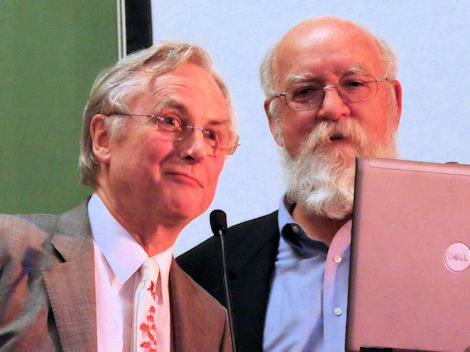
Taking to the podium in cheerful good humour, prompted in part by the obvious similarity between his own bearded visage and that of the cardboard Darwin cut-out standing stage left, Dennett launched enthusiastically into the reverse engineering of religion.
What was in store for the world’s religions? Would they sweep the planet? Would they die out rapidly or drift out of fashion – like the smoking habit ? Or would they transform themselves into creedless moral entities – keeping up the good work but without the mumbo-jumbo? Whatever the future holds for religion, Dennett’s mantra is that if we are going to have any steer over it, we had better understand it – from a scientific point of view.
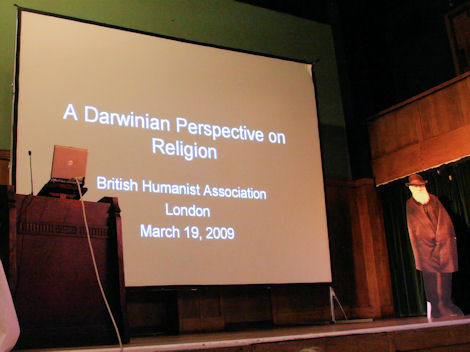
Dennett treats religion as a Darwinian phenomenon. Human beings put a lot of energy into it – so what’s the biological justification behind it?
Religions, Dennett argues, are the inevitable product of word evolution. He see words simply as memes that can be pronounced. Memes – the name coined by Dawkins to describe units of cultural information transfer that are in some ways similar to genes. Further, words and letters represent a digitisation of language, meaning they can be accurately replicated – even without understanding, because of their consistency with a semantic alphabet. So however crazy an idea expressed in words might be, it can still multiply irrespective of its meaning being understood or making rational sense.
How might the first word memes have come about? Using a Darwinian analogy, Dennett likened the first word memes to wild animals evolving through natural selection in which “evolution is the amplification of something that almost never happens” . As such, it would only have taken someone to give an arbitrary name to a strange noise in the woods one day (fairy, goblin, monster etc.), for that name to eventually get around a wider community. The seeds of superstition would have been sown. Some notable memes, by virtue of a special repulsiveness or attractiveness, would have survived into folklore. It is these memes, Dennett said, that are “the ancestors of the gods” at the core of the world’s religions.
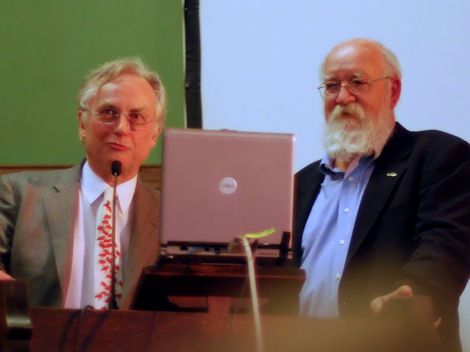
But that was only phase one. When these ‘wild memes’ are purposefully looked at, studied, and manipulated by people, they become more powerful. Some humans (e.g.priests) might dedicate themselves to keeping such memes alive and thriving, even when by themselves they are no longer very convincing. The modern religions resulting from this process and that still survive today represent a tiny fraction of all past religions, and are analogous to surviving languages or species.
Good design means these husbanded memes have inbuilt mechanisms for survival. For example, many religions make man a ‘slave to the meme’ – it’s called subservience.
Dennett described an interesting possible influence of the placebo effect in our cultural religious development. Human susceptability to ritual may be a result of our reproductively successful ancestors being the ones who – through receptiveness to placebo – enjoyed the health benefits of shaman ritual. Other self-maintenance devices built into modern religions include the glorification of incomprehensibility, warnings not to engage with reasonable criticism (on the basis that you’re talking to the Devil, and he’s a better debater than you), and the idea that a belief in a god is a pre-condition for morality.
And that brought Dennett near to his close, and us full circle to Dumbo, and the argument that we have religion because we need it. Dennett argued we no longer need the crutch represented by Dumbo’s feather. Indeed, it’s harmful to hang on to religion, what with the likes of cult suicides and death sentences for blasphemy. But religion is most harmful as a threat to a rational world view. And how does religion differ from other factors that disable rationality, such as drugs or alcohol? Only religion, Dennett said, “honours the disability”.
Also Interesting – Dennett’s debate last year with Robert Winston

